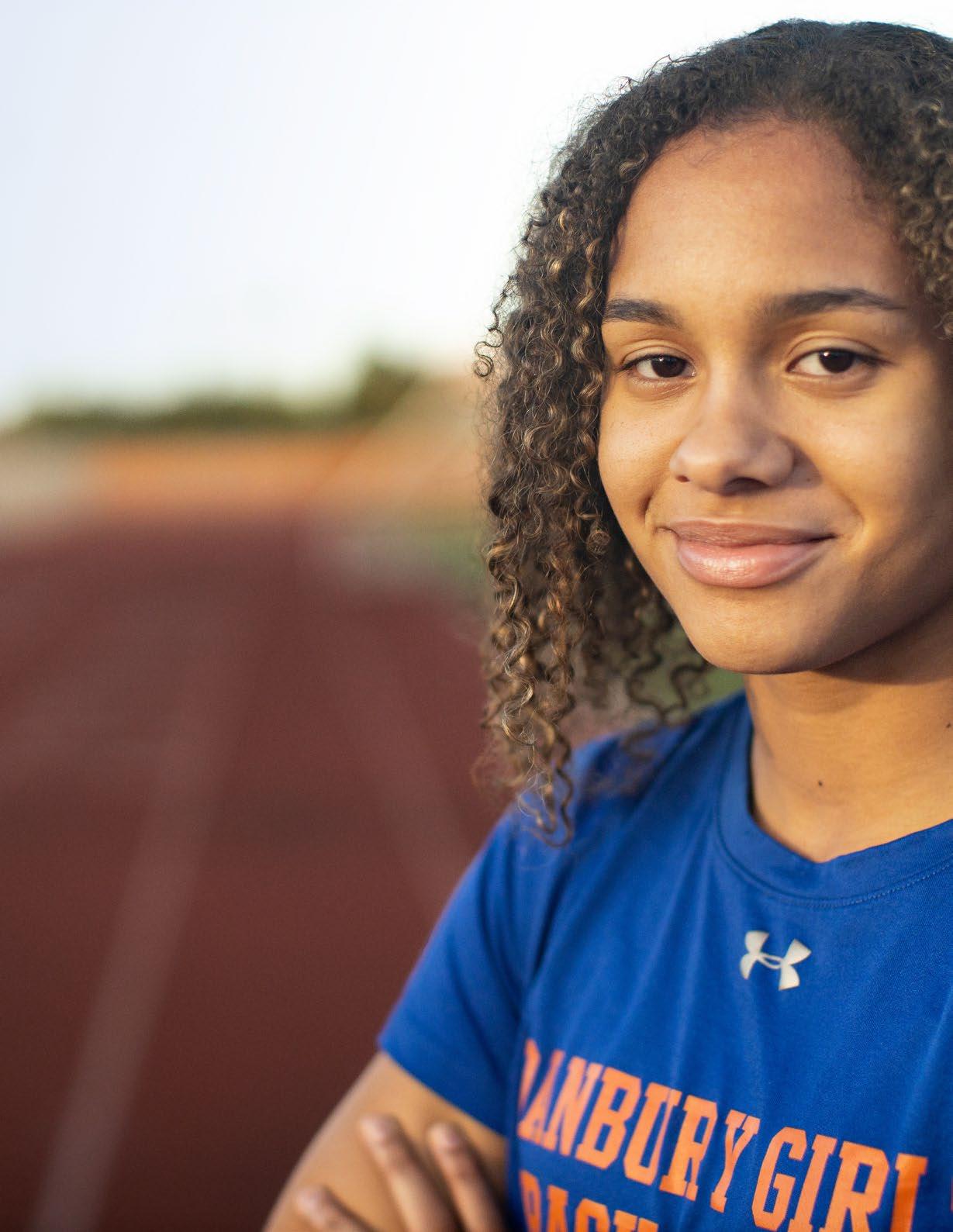
4 minute read
My View
from A Noble Cause
My View Why Boys Don’t Belong In My Sport
By Alanna Smith
Let’s race!”
This plea came from my twin brother, Nicholas, pretty much every day when we were 5 or 6 years old. We’d pick a spot in our backyard, plant our feet side by side, and take off across the grass.
“Let’s go again!” my competitive brother would call out as soon as we’d had a minute to catch our breath.
So we raced again … and again … and again.
You might say this was a preview of my life today, as a high school athlete: running every day, always trying to win.
Except in high school, I don’t race against boys. Or at least I didn’t … until someone changed the rules.
The first glimpse of my athletic ability came when I was in first grade. My mom entered me in a one-mile race for a school fundraiser, and I came in second to a fifth grader. I’d never run a mile before. My mom still talks about watching me cross the finish line with a long line of kids trailing behind me.
But I didn’t get serious about running until sixth grade, when I joined the track team at my middle school in Danbury, Connecticut. I’d run track the year before, and enjoyed it. I loved the feeling of accomplishment when I pushed myself to run a little faster every day. But middle school brought a new level of competition, because now I would be racing against older kids.
My focus was short-distance running: the 100-meter, the 200-meter and the 400-meter. I became the 100-meter Connecticut state champion, beating even seventh and eighth graders to win my race. That’s when it hit me: I was good at this. I knew if I kept training and worked hard, I could keep winning in high school. And maybe even beyond that.
I joined the Danbury High School track team, and broke a school record in the 400-meter my freshman year. I won a handful of medals that year, and met my goal to win the 400 at the state championship. I was proud of that achievement. When a local paper ran an article about my successful season, I found out that some had called me “the sprinter of all sprinters.”
Then a new competitor came along. Toward the end of my freshman year, two years ago, I found out I would be racing at the Connecticut State Open against a male who identifies as a girl. I couldn’t believe it. I’d spent the year working on endurance, speed, and strength, but I had little chance of beating the physical strength of a biological male.
I make sacrifices to be good at my sport. My team has practice six days a week, and I also do runs on my own — constantly working to shave fractions of seconds off my race times. I don’t stay out late on Friday nights, like a lot of my classmates do, because I have to wake up early for Saturday practice. When practice is canceled, as it often is during the snowy Connecticut winters, I find a place — indoors or WATCH See Alanna tell out — where I can keep her story in her own words up with my sprints. The thrill of at ADFlegal.org/fj-Alanna competing against girls like myself who train hard is rewarding. I compete to be the best, to be the fastest, to be a champion on a level playing field. But it’s hard to ignore the physical differences between us and biological males when they are lined up with us in the starting blocks. Mentally, we know the outcome before the race even starts.
It just isn’t fair for anyone born male to compete against girls. That unfairness doesn’t go away because of what someone believes about their gender identity.
Alanna Smith
My role model is Sydney McLaughlin, a runner who went to the Olympics when she was 16 (she’s now 21). During my first track practice in high school, someone told me, “You look like Sydney McLaughlin’s twin.” And I said, “That’s really cool, because I want to be just like her.” But even female Olympic athletes like Sydney would lose to literally thousands of boys and men in direct athletic competition.
I want to see how far my sport will take me. I plan to go pro. And I want other female athletes to have their best chance at achieving their own goals, whether that’s victory and recognition in a local meet, or at the national level.
That’s why I decided to join two fellow athletes in my state, Selina Soule and Chelsea Mitchell, in taking a stand against policies that allow biological men to compete in women’s sports. After first filing a complaint with the U.S. Department of Education, we filed a lawsuit through our attorneys at Alliance Defending Freedom. Another athlete, Ashley Nicoletti, has also joined us in our fight for fairness.
Since the four of us decided to take a stand, we and our parents have received, heard, or read negative comments like “sore losers,” “transphobes,” “white-girl privilege,” and “suck it up, train harder.” But none of those comments reflect who we are. We are focused competitors who deserve a chance to compete on a level playing field.
We should not be sidelined in our own sports.







